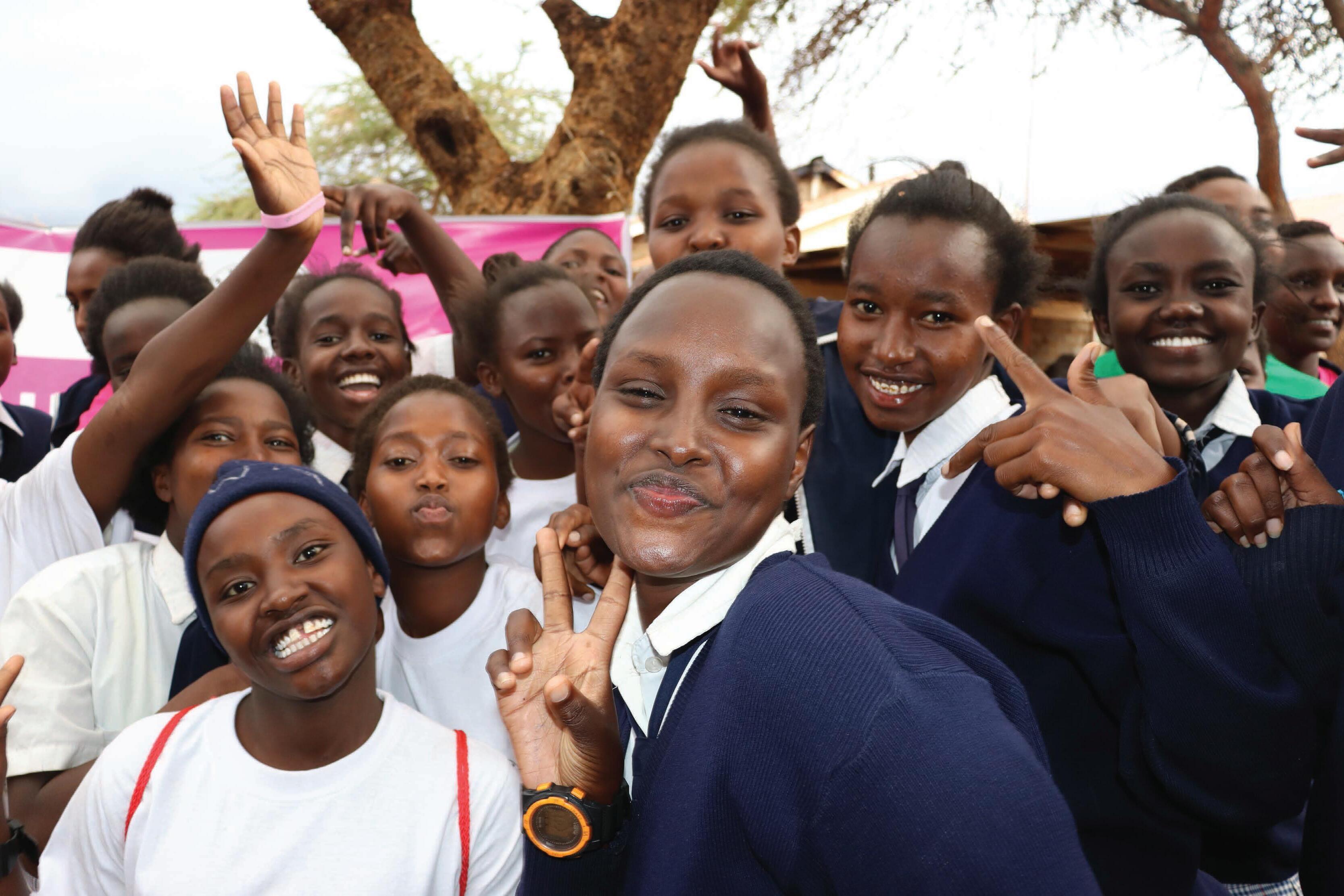ANNUAL REPORT

About Forum for African Women Educationalists (FAWE).
The Forum for African Women Educationalists (FAWE) is a membership-based Pan-African Non-Governmental Organization that operates through 34 National Chapters in sub-Saharan Africa to promote girls’ and women’s education. FAWE’s vision, mission and goal are all resolute on the well-being of girls’ education. FAWE’s Regional Secretariat is based in Nairobi, Kenya.

FAWE National Chapters: Benin, Burkina Faso, Burundi, Cameroon, Chad, Comoros, Congo, Ethiopia, Gabon, Ghana, Guinea, Kenya, Liberia, Madagascar, Malawi, Mali, Mozambique, Namibia, Nigeria, Democratic Republic of Congo, Rwanda, Senegal, Seychelles, Sierra Leone, Somalia, South Sudan, Swaziland, Tanzania, The Gambia, Togo, Uganda, Zambia, Zanzibar, and Zimbabwe.
COPYRIGHT:
This publication may not be reproduced for any purposes without prior written permission from FAWE. FAWE cannot be held responsible for any inaccuracies. Parts of this publication may be copied for use in research, advocacy, and education, provided that the source is acknowledged.
©FAWE Forum for African Women Educationalists (FAWE).
Executive Summary 6 Acknowledgements 7 Preamble 8 Acronyms 9 4 Chapter 1: Endless possibilities 10 FAWE scholars perform exemplary in school. 10 Education and leadership opportunities for all 10 FAWE/MASTERCARD FOUNDATION SCHOLARS LAUDED FOR THEIR 11 OUTSTANDING PERFORMANCE WHILE AT INES-RUHENGERI Another chance at university education 12 Scholarship entrepreneurship fund (SEF) 12 Commonwealth scholarships 12 NORAD Project on Youth Sustained Business Start-ups 13 Ford Foundation Tamatisha! 13 Imarisha Msichana! 13 Forum for African Women Educationalists (FAWE) 14 launches new programme to help reduce incidences of teenage pregnancy in Kenya Echidna Giving Phase II 15 Sexual and reproductive rights for all 16 Make Way 16 Sexual Health and Reproductive Education (SHARE) 17 Equipping Trainers of Trainers (TOTs) with training skills 19 EDUFAM 19 Teach them young! 20 School Model Leadership Module: Education is about creating leaders for tomorrow. 20 Chapter 2: Loud and clear! FAWE at the heart of advocacy for girls and women in Africa 21 A road map for Advocacy 21 Gender is my Agenda Campaign (GIMAC) 21 Commemoration of Advocacy days 22 Taboos cause challenges in menstrual health management. 23 FAWE Rwanda celebrates the 2022 World Youth Skills Day 25 Child Rights and education 26
1 2
TABLE OF CONTENTS
5 Chapter 3: To work towards a strong institutional capacity for FAWE to deliver its mandate. 27 Moving in one accord 27 FAWE revamps her South Sudan chapter to enhance girls’ access to 27 quality education and training opportunities in South Sudan Publications 28 Growing staff capacity in Information Technology 29 Resource Mobilization efforts for the year 2022 29 FAWE Endowment Fund 29 Donor Round Table Meeting 29 Chapter 4: Alumni spotlight 30 Annah Hodhera 30 FAWE alumni Clement Kaponda becomes GPE youth leader. 31 Cheka Omary 31 Chapter 5: Setting the pace for girls’ education agenda in 32 Africa through research and evidence generation. HEAP success stories 33 From Despair to Success 33 Cleophus Komujuni 33 Chapter 6: Staff corner 34 FAWE explores opportunities for scaling up Early Childhood Education (ECE). 34 School re-entry policies must be effective for teenage mothers in Africa 35 Chapter 7: Heroine corner 37 Remembering the Late Ms. Berthe Meda, Board Chair, FAWE Burkina Faso 37 Remembering Professor Christine Dranzoa, Board Chair, FAWE Africa (2014-2017) 38 Chapter 8: FAWE Charity Dinner at a glance 40 Pictorial 43 3 4
5 6 7 8
EXECUTIVE SUMMARY
The Forum for African Women Educationalists (FAWE) is pleased to present its 2022 Annual Report, which highlights the organization’s key achievements over the past year.
FAWE remains dedicated to promoting gender equity and equality in education throughout Africa, and this year’s report details the various initiatives and programs that have contributed to this goal. One of our primary achievements over the past year was the successful implementation of the FAWE Mastercard Foundation Scholars program. A number of students from both Ethiopia and Rwanda not only completed their education and graduated, but also recorded outstanding performance in their institutions. FAWE was also able to once again partner with the Mastercard Foundation to kick off the Imarisha Msichana (equivalent meaning to “Build Up the Girl’) 2-year programme aimed at ending teen pregnancy in Kenya.
Martha R.L Muhwezi Executive Director

In a bid to improve access to education for vulnerable and marginalized girls, including those in conflict-affected areas, FAWE revived and re-launched FAWE South Sudan which had for years become dormant after the South Sudanese civil war. Through partnerships with governments, civil society organizations, and other stakeholders, we were able to make progress and ensure that FAWE’s goal of providing access to quality education and training reached the girls and women of South Sudan.
In addition, FAWE continued to advocate for policy changes and investment in education, including increased funding for girls’ education and the integration of gender-responsive approaches into education systems.
Despite the challenges posed by the COVID-19 pandemic in previous years, FAWE was able to adapt and continue its important work, including the development of innovative digital platforms and tools for remote learning.
We would like to express our sincere gratitude to all of our partners, donors, and supporters for their continued support of our mission. We remain committed to working towards a future where all African women and girls have access to quality education and the opportunity to reach their full potential.

6
ACKNOWLEDGEMENTS

The FAWE 2022 Annual Report was conceptualized and developed by the Regional Secretariat (RS) led by the Executive Director, Mrs. Martha R.L Muhwezi. The Regional Secretariat would like to thank the FAWE Executive Board, for providing strategic guidance and support in the past year. We would also like to thank each of our 34 National Chapters for their time, energy, contribution and enthusiasm towards advancing women and girls’ education in Africa.
FAWE is grateful for the financial support provided by various partners, including the Mastercard Foundation, Echidna Giving, the Ministry of Foreign Affairs Netherlands (Dutch Government) through the Make Way program and the Break Free Alliance, the Embassy of Sweden in Addis Ababa through International IDEA, the Ford Foundation, the French Embassy in Senegal, the Foundation Paul Gerlin Larjoie (FPGL), the International Development Research Centre (IDRC), UNESCO, EDUFAM, the Islamic Development Bank (IsDB), the Karanta Foundation, Global Affairs Canada, and UNICEF.
We extend our heartfelt gratitude to the entire FAWE Regional Secretariat team for the successful implementation of the programmes outlined in this report. We also extend our appreciation to Teresa Omondi - Adeitan, the Deputy Executive Director and Head of Programmes, for her overall guidance and support. Special thanks go to Emily Buyaki, Communication Officer, Beverly Mumbo, Programme Officer and Cynthia Barasa, Programmes Assistant for their dedicated work in producing this report. The team has captured invaluable lessons and addressed issues that are crucial to the education and empowerment of girls and young women in Africa. Lastly, we would like to acknowledge and thank our alumni for their valuable contributions and support in the creation of this report.
It is my great pleasure to introduce the 2022 Annual Report for the Forum for African Women Educationalists (FAWE). Over the past year, FAWE has made significant strides in advancing education for women and girls around the world.

We appreciate that education is a fundamental human right and a key driver of economic and social development. However, women and girls still face significant barriers to accessing education, including poverty, discrimination, and societal norms that prioritize boys’ education.

FAWE is dedicated to breaking these barriers and fostering a world where every woman and girl can attain quality education. Through our extensive range of programs and initiatives, we have exerted unwavering efforts to empower women and girls, enabling them to unleash their full potential. In this report, you will find a detailed account of our achievements over the past year, including the impact of our educational programs, our advocacy efforts, and our partnerships with like-minded organizations. You will also find inspiring stories of the women and girls whose lives we have touched through our work.
Our remarkable achievements would not have been possible without the unwavering dedication and tireless efforts of our exceptional staff, volunteers, donors, and partners. I am profoundly grateful to each and every one of you for your unwavering support and steadfast commitment to our mission. Your invaluable contributions have touched the lives of countless individuals and have paved the way for a brighter future. From the depths of my heart, thank you.
As we gaze into the horizon of the future, our unwavering commitment to building a world where every woman and girl can access education and unlock their boundless potential only grows stronger. It is our heartfelt desire that this report ignites a spark of inspiration within you, motivating you to unite with us in this crucial endeavour. Together, let us embark on this transformative journey and shape a future where dreams know no boundaries.
8
PREAMBLE
Hon. Simone De Comarmond, FAWE Board Chairperson
ACRONYMS
ACERWC African Committee of Experts on the Rights and Welfare of the Child
AFECN Africa Early Childhood Network
AU African Union
CCG Country Coordinating Group
CEO Chief Executive Officer
CESA Continental Education Strategy for Africa (CESA 16-25)
COVID-19 Corona virus disease of 2019
CSE Comprehensive Sexuality Education
CSO Civil Society Organization
ECE Early Childhood Education
ENAI Ewang’an Nadede Advocacy Initiatives
FAWE Forum for African Women Educationalists
FAWEK FAWE Kenya
FCDO Foreign Commonwealth Development Office
GES4CESA Gender Equality Strategy for Continental Education Strategy for Africa
GIMAC Gender is my Agenda Campaign
GPE Global Partnership for Education
GRP Gender Responsive Pedagogy
HEAC Higher Education Access Certificate
HEAP Higher Education Access Programme.
INGO International Non-Governmental Organizations
KICC Kenyatta International Conference Center
MTR Mid-term review
MYE Meaningful Youth Engagement
NC National Chapter(s)
NCHE National Council for Higher Education
NGO Non-Governmental Organization
RS Regional Secretariat
SAT Southern Africa Trust
SHARE Sexual Health and Reproductive Education
SRGBV School Related Gender Based Violence
SRHR Sexual Reproductive Health and Rights
STEM Science Technology Engineering and Mathematics
TVET Technical and Vocational Educational and Training Organization
UNESCO United Nations Educational, Scientific, and Cultural
UNICEF United Nations Children’s Fund
9
CHAPTER: ENDLESS POSSIBILITIES


Envision a world brimming with infinite possibilities for women and girls - a world where they are wholeheartedly supported to unlock their fullest potential and actively contribute to their communities and the economic prosperity of their nations. For the past three decades, FAWE has steadfastly dedicated itself to empowering women, enabling them to pursue their dreams of education and equipping them with the skills to excel in all facets of life. Together, let us continue to forge ahead, nurturing a future where every woman’s aspirations know no bounds. This chapter highlights activities undertaken in 2022 with regard to programme implementation.
FAWE Scholars Perform Exemplary in School
With immense pride, FAWE finds itself in the final stretch of its dedicated support for the Mastercard Foundation Scholars Programme. Embarked upon nearly a decade ago, this transformative journey has left behind a trail of countless achievements in Ethiopia and Rwanda.
In July 2022, the last cohort in Ethiopia successfully completed their education, while their Rwandan counterparts achieved the same milestone in 2023. Presently, among the 838 scholars in Rwanda, an inspiring total of 597 young women are pursuing their university studies. Similarly, in Ethiopia, out of the initial 800 enrolled, only one remarkable young woman remains at the secondary school level.
In Rwanda, March 2022 witnessed the graduation of 53 students from INES Ruhengeri, with an exceptional eight scholars earning high-class honours in diverse programs, opening up new doors of opportunities for them. Notably, three of these scholars were awarded tutorial assistantships in computer science at INES Ruhengeri.
Since the inception of the tertiary scholarship, a total of 95 Rwandan scholars have proudly graduated. Furthermore, on 2nd December 2022, an additional 179 scholars celebrated their welldeserved graduation, with 51 of them already securing employment.
In Ethiopia, out of the 182 scholars who completed their grade 12 exams in 2021, an impressive 151 passed and became eligible for university in 2022. However, only 118 of these remarkable individuals qualified for government sponsorship. Nevertheless, the 30 alumni who did not qualify for government funding were bestowed with the esteemed alumni entrepreneurship grant, empowering them to establish small businesses either individually or in groups. A cohort of 197 scholars from cohort 5 proudly graduated from secondary school in November 2022, marking a significant achievement.
As we approach the culmination of this extraordinary journey, we reflect upon the countless triumphs that have been realized, nurturing a sense of profound gratitude and hope for the bright futures that lie ahead for these exceptional individuals.
Education and Leadership Opportunities for All
The Higher Education Access Program (HEAP) is an eight-year initiative aimed at providing educational opportunities and leadership development to 300 young women and men hailing from economically disadvantaged regions of Uganda. Its overarching goal is to facilitate their access to higher education or assist them in securing employment in sectors that contribute to the development of their communities and the country. Within the framework of the HEAP program, a total of 334 students (128 males and 206
10
1
females) are currently receiving support. Notably, in March 2022, 14 students from Jinja School of Nursing and Midwifery successfully graduated. We take immense pride in announcing that a FAWE scholar emerged as the top-performing student across the university. Furthermore, in May 2022, an additional 15 scholars graduated from Mbarara Institute of Science and Technology, with three of them achieving first-class honours. To date, a total of 133 students have successfully graduated under the HEAP programme.

FAWE/MASTERCARD FOUNDATION SCHOLARS LAUDED FOR THEIR OUTSTANDING PERFORMANCE WHILE AT INES-RUHENGERI
By FAWE Rwanda

FAWE Rwanda joyfully commemorated the remarkable achievements of its inaugural cohort of graduands, who were participants of the Mastercard Foundation scholarship programme. This momentous occasion took place during the 13th graduation ceremony of INES Ruhengeri, where a grand total of over 800 students were conferred degrees on March 11, 2022.
The graduation included 53 FAWE/Mastercard Foundation scholars out of whom 28 were from cohort one and 25 from cohort two.
UKWITEGETSE Gikumi, who was awarded Rwf 1 million as a top performer in her faculty, graduated in Computer science and has been the 1st in her class for three consecutive years up to graduation. Speaking to Top Africa News, she extended her gratitude to FAWE Rwanda for the support along her schooling journey from high school to university.
Three other scholars namely Byukusenge Joselyne, Umutoni Yolanda, and Irakoze Dinah have already started a professional internship at INES Ruhengeri and shall be Tutorial assistants at the university.
Speaking on behalf of INES Ruhengeri, Father Hagenimana Fabien, the Vice-Chancellor, expressed how the presence of FAWE scholars at the university has brought about transformative changes. He acknowledged that the university was not accustomed to receiving such a significant number of high-performing students from secondary schools.
Graduates of the Mastercard Foundation Scholars program listen to the proceedings during the graduation ceremony on 11th March 2022 at Ines Ruhengeri.
“Normally in Rwanda, the best performers in secondary school receive government scholarships to the university of Rwanda or to Rwanda polytechnic then private institutions tend to receive either those who say no to the scholarship or those who have sponsors. It’s not really easy for private universities to get the best performers from secondary school.” Said Father Fabian.
He added that “FAWE scholars have been a catalyst because, since their arrival at the university, they changed the whole environment as they brought positive competition and today, the science department which was formerly dominated by male students, is now dominated by females. And that’s why you have seen that girls came among the best performers who were awarded during the graduation ceremony.”
11
“I really thank FAWE and Mastercard foundation for being real parents to us and taking care of vulnerable/poor people like me by providing everything we needed so that we can get access to education.” She said.
Another chance at university education
Launched in 2019 as a partnership between FAWE Uganda and the National Council for Higher Education (NCHE), the Higher Education Access Certificate (HEAC) has been a game changer for many students in Uganda. The curriculum is thoughtfully crafted to establish a strong academic foundation, nurture essential skills, and foster positive attitudes among students through innovative teaching and learning experiences. It is a condensed and immersive programme specifically designed to support students who may not meet the assumed knowledge prerequisites of a course or who may feel uncertain about their preparedness for university studies. As such, it serves as an additional pathway to access higher education in Uganda, ensuring greater inclusivity and opportunities for students.
Initially, at the inception of the programme, only three universities (Gulu, Mbarara University of Science and Technology, and Busitema) were selected as pilot institutions for HEAC. Fast forward five years, and we are proud to announce that four additional universities (Kabale, Muni, Lira, and Mountains of the Moon) have embraced HEAC. Further, three other universities (Ndeje, Soroti, and Kyambogo) have expressed their keen interest in adopting HEAC. As of now, a total of 554 students, including 60 students supported by FAWE, have enrolled in HEAC across the seven universities. Worth noting, the National Council for Higher Education in Uganda has officially recognized HEAC as the fourth pathway to degree and diploma courses, alongside direct entry, diploma, and mature entry options.
Scholarship Entrepreneurship Fund (SEF)
FAWE in partnership with the Mastercard Foundation continues to support scholars excel in their entrepreneurship journeys. Following a monitoring visit conducted in February 2022, it was observed that 43 scholars’ projects are already witnessing profits and economic gains. A few of the agricultural projects are still in the production stage. Additionally, 1 student working on the processing of soybeans and Tofu was awarded $5000 through the prestigious Resolution Fellow grant under Mastercard Foundation along with lifelong membership to the fellowship.
In honour of International Youth Skills Day on July 15, 2022, FAWE RS and FAWE Rwanda joined forces to organize a two-day event on July 14 and 15, 2022. The event took place at the Rwanda Career Women’s Centre and saw the participation of 25 SEF beneficiaries and alumni. During the event, the participants received training on Sexual and Reproductive Health and Rights (SRHR) for economic empowerment and were mentored on entrepreneurial skills. The event served as a platform to showcase FAWE’s impactful initiatives in youth skilling, fostering new and continued partnerships with like-minded stakeholders such as Digital Opportunity Trust Rwanda and Harambee.
Commonwealth Scholarships
In 2023, a total of 52 candidates nominated by FAWE had the honour of applying for postgraduate scholarships through the Commonwealth Secretariat. Among them, 22 outstanding individuals were awarded the prestigious scholarship. Looking ahead, FAWE has initiated the call for applications for the 2023 scholarships, and we are proud to announce that we will be submitting a list of 52 nominees from 10 different countries for consideration. We extend our heartfelt wishes to each and every scholar, hoping for their academic journeys to be filled with success and fulfilment.

12
12
NORAD Project on Youth Sustained Business Start-ups
The project implemented in Mali and Zanzibar successfully closed in March 2022. The project documentary can be accessed via the following link: https://www. youtube.com/watch?v=bB3Ng5zdTP4
Ford Foundation Tamatisha!
Tamatisha! (Meaning to bring to an end) in Swahili, is a programme between FAWE and the Ford Foundation that aims at empowering teenagers to curb early pregnancies. Implementation is being done by FAWE Kenya and Ewang’an Nadede Advocacy Initiatives (ENAI –Africa). A baseline survey concluded and validated by key stakeholders in August 2022 affirmed that the number of teen pregnancies in Kenya rose in 2019-2020 due to Covid-19 lockdown and restrictions. In February and August 2022, key stakeholders in Narok, Nairobi, Machakos, Nakuru and Kajiado county converged to discuss on the importance of community social accountability on policy implementation. The stakeholders committed to support the project’s course in championing for proper implementation of SRHR policies at county level. Further, Technical Working Groups (TWGs) were formulated in the 5 implementing counties. The TWGs are working on ensuring county integrated development plans are gender responsive.
ENAI-Africa hosted a three-day youth mentorship workshop in April 2022 where 250 adolescents were sensitized on SRHR and curbing teen pregnancy. In June 2022, 10 schools in 5 counties were mapped to be considered for Centres of Excellence (CoE) transformation. Subsequently, in September 2022, 150 teachers and Parents-Teachers Association members from the 10 partnering schools were trained on the concept of COE.

Furthermore, Tuseme clubs have been established in the 10 schools to provide essential psychosocial support to the students. Currently, there are 684 students who are active members of these clubs. In addition, Peer-to-Peer mentorship has reached out to 5127 students, serving as indirect beneficiaries of the clubs. FAWE Kenya has also forged partnerships with local media stations to raise awareness and sensitize communities about the prevention of teenage pregnancies and the importance of school re-entry for teenage mothers.
Imarisha Msichana Program
Under the new name “Imarisha Msichana!” (formerly known as Dedisha!), the program underwent a rebranding in 2022 to reflect its essence, which means “Build Up the Girl” in English. The two-year program, funded by the Mastercard Foundation, was officially launched on June 28, 2022. It aims to combat teenage pregnancy in Kenya and is currently being implemented in 20 counties across the nation: Nakuru, Nairobi, Machakos, Elgeyo Marakwet, Kiambu, Garissa, Bungoma, Kakamega, Nyeri, Migori, Murang’a, Kajiado, Narok, Homa-Bay, TransNzoia, Nyandarua, Busia, Meru, Siaya, and Turkana.
Recruitment of the necessary personnel was completed in 2022, and inception activities began promptly thereafter. Mapping of the 160 participating schools across the 20 counties has been successfully accomplished, with a baseline survey scheduled for completion in January 2023.
13
Forum for African Women Educationalists (FAWE) launches new programme to help reduce incidences of teenage pregnancy in Kenya

Tagline: Her education, her future!
On June 28, 2022, the Forum for African Women Educationalists (FAWE) launched an innovative program aimed at making substantial progress in reducing the prevalence of teenage pregnancy in Kenya. This groundbreaking initiative, known as Imarisha Msichana (which translates to “Build her up/Strengthen the girl”), is currently being implemented in 20 counties across Kenya. These counties include Nakuru, Nairobi, Machakos, Elgeyo Marakwet, Kiambu, Garissa, Bungoma, Kakamega, Nyeri, Migori, Murang’a, Kajiado, Narok, Homa-Bay, Trans-Nzoia, Nyandarua, Busia, Meru, Siaya, and Turkana.
Teenage pregnancies persist as a significant and ongoing challenge in Kenya, carrying substantial economic, health, and social implications. Not only does this issue rob young girls of their childhood, but it also presents a formidable obstacle to their ability to fully realize their potential and contribute meaningfully to the social, economic, and political development of the nation.
Speaking during the launch event held in Nairobi, Kenya, FAWE Africa’s Executive Director Ms. Martha Muhwezi said, “Teenage pregnancy continues to be one of the key hinderances to girl child education in Africa in as whole and Kenya in particular. We have seen instances whereby girls get pregnant and never resume their education. This perpetuates a vicious cycle of poverty. As FAWE, we endeavour to ensure that girls get equal opportunities at not only education but also in their social and professional lives to achieve their full potential.”
The programme will run for the period of two years, June 2022 to June 2024. The main partners are teen mothers/adolescents ages of 9 to 18 years and young women aged 19 to 25 years. In the framework of this programme, young girls will be provided with useful knowledge and necessary skills to be able to fully transition to adulthood and help them become productive members of their communities.
“We have chosen this age group because they are young and therefore at risk of missing out on a bright future. It is possible and it has been proven before that a teenage mother can resume her studies and excel in her academics.” Said Ms. Terry Otieno, CEO, FAWE Kenya.
14
(From left) FAWE Board member Prof. Genevieve Mwayuli, Hon. Lina Jebii Kilimo, FAWE Kenya board member, State House Girls’ High School student, Executive Director FAWE Africa, Martha Muhwezi, Ms. Evelyne Owoko, Permanent Secretary, Early Learning and Basic Education and Ms. Teresa Omondi, FAWE Africa Deputy Executive Director cut a cake to culminate the launch of Imarisha Msichana Program on June 28th 2022 in Nairobi Kenya.
Also speaking during the event and representing Dr. Julius Jwan, Permanent Secretary, Early Learning and Basic Education, Ms. Evelyn Owoko, Ministry of Education Policy and Partnership East Africa Community Affairs said, “We still need to work harder to empower the girl child. Let us remember SDG 4 which talks about lifelong learning and leaving no one behind. Re-entry policies such as the ones advocated by FAWE are key in achieving education for all. As the Ministry, we support organizations in their endeavour to support education.”
The Imarisha Msichana program activities will include collaboration with key stakeholders in generating credible and acceptable data on teenage pregnancies in Kenya that will advise on apt solutions; champion for re-entry of girls to school, sensitization forums for girls, young women, boys, young men, parents, community leaders on human sexuality and prevention of teenage pregnancy and early marriages, media advocacy programmes, and awards of FAWE gender equality ambassadors.
This would entail investing in adolescent girls and young women in the select counties to grow and effectively participate in their society. The selection will also include specific targeting of adolescent girls with disability and displaced/refugee girls. These girls will be consulted on the proposed solutions and where applicable participate in the implementation of the project. The girls will be introduced to FAWE’s Tuseme youth empowerment programme that enables female youth empowerment and gender awareness by enhancing girls’ self-esteem, leadership, social and life skills, and promotes a positive attitude amongst boys towards girls’ education. Tools of empowerment will include usage of existing Tuseme Manual to establish Tuseme Clubs in participating schools.
Echidna Giving Phase II
The Echidna Giving II program, focused on strengthening institutional capacity, concluded in September 2022. FAWE is now preparing for the 3rd phase of the program after receiving approval for the application. In this new phase, FAWE will collaborate with four chapters. In July 2022, FAWE RS staff travelled to Liberia to provide support to the chapter. Activities included conducting Gender Responsive Pedagogy (GRP) training for 40 stakeholders, facilitating elections during the General Assembly, and conducting an induction for the new board. The aim is for the newly trained trainers to share their knowledge with others for the promotion of gender-responsive learning in Liberia.
FAWE organized a webinar on the International Day of Women and Girls in Science, providing a platform for knowledge sharing and mentorship between female practitioners and young girls and women interested in various STEM disciplines. Similarly, FAWE hosted a webinar on International Women’s Day, featuring women from diverse backgrounds and fields sharing their experiences and testimonies on breaking barriers within their areas of influence.
Additionally, the project supported the FAWE donor roundtable held in July, which was attended by at least 15 partners. The discussions during the session offered an opportunity for FAWE to showcase its work to partners and gain insights into their strategic focus for the year 2022.
15
Sexual and reproductive rights for all Make Way
Make Way is a five-year program operating in Ethiopia, Kenya, Rwanda, Uganda, and Zambia. Its primary objective is to empower vulnerable young people by promoting their rights, enhancing access to accurate information, and improving services. The program focuses on lobbying and advocating for the sexual and reproductive health and rights (SRHR) of vulnerable young individuals.
On September 30, 2022, FAWE made its debut in Uganda as a strategic partner organization of the SRHR Alliance. This partnership will facilitate the implementation of the Make Way program in Uganda. In August 2022, FAWE took the lead in developing the Meaningful Youth Engagement guide. This guide will be adopted by FAWE RS and FAWE NC staff through a series of capacity-building sessions scheduled for the fourth quarter.
Similarly, aimed at combating teen pregnancy and child marriage, the Break Free! Alliance programme conducted an outcome harvesting exercise in Kenya and Ethiopia to evaluate the success and progress towards the program outcome at the national and regional level. The Kenyan consortium team held a training on child safeguarding which was identified as a key gap in the outcome harvesting review. Additionally, FAWE, Rozaria Memorial Trust and SRHR Africa Trust (SAT) hosted an event during the voluntary national review of the SDGs to lobby for increased youth participation in regional processes and better education financing as schools recover from COVID.
The report can be accessedvia https://fawers-my. sharepoint.com/:b:/g/personal/jkhamati_fawe_org
EbesLvEqg8dKg3Nr0hliCvUBwLiX86EKdehXZENDvYMHog?e=J8xer6.
Further, the regional consortium held a side event on youth engagement in SDGs during the African voluntary review on SDGs. FAWE’s role on the event was to set out status on implementation of SDG 4 .
Recognizing the utmost importance of incorporating youth participation in project activities, the Break Free consortium partners organized the first in a series of youth meetings from June 9th to 11th, 2022. This meeting specifically focused on engaging young people and brought together participants from Zambia, Ethiopia, Kenya, and Sudan. The gathering aimed to facilitate learning and exchange of experiences related to youth engagement in their respective countries. During the event, FAWE delivered a presentation on youth engagement at the African Union and the East African Community.
As the lead organization of the Kenya country consortium, the programme actively promoted Meaningful Youth Engagement (MYE). In collaboration with the Make Way Programme, the program co-hosted an MYE training in Nairobi in October. Additionally, the program provided support for the MYE youth workshop held in Niamey, Niger from November 8th to 10th. Furthermore, the programme contributed to the development of the AU goodwill ambassador report on child marriage and participated in the subsequent validation meeting.
16
Sexual Health and Reproductive Education (SHARE)
The baseline survey under the SHARE project kicked off in July 2022 and data collection was conducted in Uganda and Ghana allowing for implementation of Year 1 activities to begin. The SHARE consortium conducted a training on 6th October 2022 on utilization of Teams as a document sharing tool.
Right To Play, FAWE, FHI 360 and WaterAid launch SHARE project to support sexual and reproductive health and rights for adolescent youth.
The Sexual and Reproductive Education (SHARE) project is being implemented in a consortium led by Right To Play in partnership with the Forum for African Women Educationalists (FAWE), and WaterAid, with technical support from FHI360. It aims to advance gender equality by improving access to sexual and reproductive education and genderresponsive health care for young people, especially girls and young women. The five-year project will take an intersectional approach to equipping young people to make informed decisions about their reproductive health. It will support youth to keep themselves safe from disease, avoid early or unwanted pregnancies, and become advocates for their own health, well-being and rights.
“In this day and age, we cannot afford to bury our heads in the sand regarding the sexual and reproductive health rights of girls and young women. The stakes are too high and the price too heavy to bear unless we act effectively. The time to address the elephant in the room and act accordingly is now,” says Martha Muhwezi, Executive Director, FAWE Africa.
SHARE is supported by the Government of Canada and funded by Global Affairs Canada. It is part of the historic $325-million commitment Canada made when it hosted the Women Deliver conference in 2019, an investment that is promoting gender equality and the health and rights of women and girls and supporting the realization of Canada’s Feminist International Assistance Policy. The Honourable Harjit S. Sajjan, Minister of International Development and Minister responsible for the Pacific Economic Development Agency of Canada, initially announced support for the SHARE project at the Canadian Conference on Global Health in November 2021.
Though progress has been made in recent years to reduce the systemic barriers marginalized groups face in realizing their sexual and reproductive rights, more work is needed. A 2020 study conducted by the United Nations Population Fund (UNFPA) in 57 countries found that only 55% of girls and women feel they’re empowered to make decisions and exercise their reproductive rights . This lack of autonomy puts them at increased risk of unwanted pregnancies, sexually transmitted infections, and dangerous childbirth . In Ghana, the rate of adolescent pregnancies climbed from 10% in 2008 to 30% in 2017, with an additional increase starting in 2020 due to the COVID-19 lockdowns.
17
In Mozambique, almost half of girls will be married before they turn 18, and one in 10 will be married before the age of 15. In Uganda, the rate of child marriage is slightly lower, with 40% of girls getting married before 18; in recent years, the proportion of underage pregnancies (15-19 years old) has increased to 25%.

Drawing on project partners’ respective areas of expertise, the consortium will work with young adults, teachers, educators, local health workers, as well as community and government partners to increase access to sexual and reproductive health education and to gender-responsive health services for youth, especially girls and young women.
Right To Play will use over two decades of experience protecting, educating and empowering children through the power of play to equip mentors and teachers with the training they need to provide young people with evidence-based information about sexual and reproductive health through experiential learning activities in schools.
“We are proud to support youth, especially girls and young women, to build knowledge and confidence that will help them make fact-based decisions about their reproductive health,” says Susan McIsaac, CEO, Right To Play International. “Using our engaging, play-based approach to learning, we will work with our expert partners FAWE, FHI 360, and WaterAid to address the systemic barriers that keep youth from claiming their health-related human rights and empower them to become advocates for their own health.”
FAWE, will focus on advocacy and policy engagement to ensure adolescents’ sexual and reproductive health rights become a reality.
18
Photo credits: Right to Play
Equipping Trainers of Trainers (TOTs) with Training Skills EDUFAM
It is the right of every learner to study in a safe and genderresponsive environment. This enables them to feel confident, peaceful, and able to fully express themselves while pursuing education. FAWE, in collaboration with EDUFAM, conducted TUSEME and COE trainings in April and May/June 2022 respectively, in Burundi, DRC, and Rwanda. These trainings involved 90 education stakeholders, including teachers, head teachers, officials from the Ministry of Education, and representatives from FAWE chapters.
In July, GRP training was provided to 70 TVET stakeholders, with 30 participants in Rwanda and 40 in Burundi. However, due to insecurity in DRC, the GRP4TVET training was postponed and took place in November 2022, involving 40 TVET stakeholders. As a result of these trainings, participants developed action plans that are currently being implemented in partner schools and TVET institutions. The implementation of these plans is being monitored by Maison Shalom, Collectif des Associations et ONG Féminines du Burundi (CAFOB), and the Union of the Collectives of Women’s Associations of the
Great Lakes Region (COCAFEM), who serve as the project’s country implementing partners. In October 2022, FAWE provided training on monitoring and evaluation to the 30 implementing partners and project leads, ensuring effective tracking of progress and changes in the partnering schools.
Similarly, in August 2022, FAWE conducted a Training of Trainers (ToT) session on the FAWE CoE model for WASRO staff and francophone chapters from Benin, Burundi, Chad, DRC, Gabon, Guinea, Mali, Senegal, Nigeria, and Togo, with the support of KIX Lartes. During this session, FAWE also strengthened the chapters’ understanding of financial rules and accountability to facilitate the drafting and comprehension of their financial reports. Additionally, 21 participants received training on genderresponsive research methodologies and monitoring and evaluation tools developed to guide the implementation of the KIX Karanta, FAWE, and ROCARE project. The project was launched in July 2022, with an event chaired by the Malian Minister of Education. Project activities are progressing in three stages: data production by the participating
countries (including analysis and validation of provisional country reports and finalization), production of a summary research report, and the proposal of the “non-formal education centre for school purposes (CENF/ VS)” bridging class model. The identification of centres to host the project’s activities in implementing countries is also underway.
Furthermore, in collaboration with IFEEFA, FAWE conducted GRP and Tuseme trainings in Gabon, Mali, Burundi, DRC, Chad, and Guinea. These trainings targeted 40 teachers and 40 learners from 10 schools. The knowledge gained from the trainings has been cascaded to 5,673 learners, including 4,478 female learners and 1,195 male learners. The action plans developed by the ten schools in each country are currently being implemented and monitored, along with the animation of the female teachers’ network established by the project in the seven countries. A digital platform is also being created to facilitate communication within the network and to engage journalists in promoting better gender coverage in the education sector.

19
Photo credits: FAWE Malawi
Teach them young!
FAWE aims at promoting leadership among girls and women from a young age specifically in early grade. In 2022, FAWE developed and validated the model school module for Women in Political Participation. A teachers’ training on the manual was also conducted; the teachers were drawn from Kenya, Zimbabwe and DRC.
School Model Leadership Module: Education is about creating leaders for tomorrow.
By Martha Muhwezi, Executive Director, FAWE Africa
As a thought leader on matters education for Girls in Africa, the Forum for African Women Educationalists (FAWE) joins the world to mark the International Day of Education themed “Changing Course, Transforming Education”. FAWE with the support of International Democracy and Electoral Assistance (IDEA), under The Women in Political
Participation (WPP) programmes, is developing a Model School leadership module targeting girls in schools towards reducing the commonly noted metaphor of the leaking pipeline to leadership among girls and women. FAWE’s intervention was necessitated by the absence of girls-specific leadership training in schools.
The school model leadership module is designed for early stage learning to enable better understanding of how to address girls’ leadership development within the schools. Girls face a biased perception about leadership that favours boys as leaders; these biases are held by boys, girls, and sometimes parents. These biases against girls having power may be explained by lack of confidence and self-esteem by most girls, stereotyping, such as viewing girls as overly emotional or expressive. It is important that girls are not only exposed to leadership development opportunities and career options, but that intentional efforts are
made to create programs that overcome these barriers. The school leadership module is an education pathway to leadership for girls, it will address the various barriers for girls to be in leadership and, enhance empowerment and inclusivity.
As we celebrate Education, FAWE hopes that the module will be adopted by schools in Africa and beyond to instil leadership skills in girls and boys. The school environments are the only source of education for formal leadership experiences and programming to which students are exposed.
20
CHAPTER : LOUD AND CLEAR! FAWE AT THE HEART OF ADVOCACY FOR GIRLS AND WOMEN IN AFRICA

A road map for Advocacy
In 2022, FAWE developed the Advocacy Strategy for 2023-2027, which aims to advocate for the integration of genderresponsive approaches and policies in African education systems. The objective is to promote the acquisition of skills and competencies among girls and women, enabling them to contribute to and transform their societies.
As a recognized authority on girls’ education in Africa, FAWE’s Advocacy Strategy opens up numerous opportunities for collaboration and partnership with like-minded organizations. These potential partners include technical partners, development partners, strategic partners, and other key stakeholders who share common goals. The strategy serves as a platform to identify areas of collaboration and partnership that can further advance these shared objectives.
Gender is my Agenda Campaign (GIMAC)

Having served as the GIMAC Chair for over 7 years, FAWE through the Executive Director handed over the position during the 38th GIMAC session. In a colourful event that took place in Addis Ababa, Ethiopia, the GIMAC partners feted the FAWE Executive Director for steering the ship and setting the pace for the campaign.
During the 38th GIMAC commemoration held in February 2022 in Addis Ababa, Ethiopia, FAWE joined CSOs from Africa in the 38th GIMAC Pre-Summit CSOs Consultative Meeting on Gender Mainstreaming in the African Union and Member States held in Addis from the 1st to the 4th of February 2022. FAWE supported 4 youth to participate in the GIMAC young women advocacy training.

FAWE actively contributed to the production of the solemn declaration index report, a collaborative effort led by GIMAC. In addition, FAWE showcased its work during the pandemic and took the lead in the GIMAC education session, which centred around the AU theme of food security and food systems. Furthermore, as a precursor to the GIMAC commemoration in July, FAWE organized a pre-webinar aimed at gathering and consolidating the perspectives of civil society organizations (CSOs), regional economic communities (RECs), and schools on the AU theme of strengthening resilience in nutrition and food security on the African continent. The webinar attracted over 50 participants from across the continent, and their views were compiled and presented during the GIMAC education session held on July 12, 2022.
The development of the strategy involved a consultative process, including meetings with FAWE National Chapters, alumni members, and indepth discussions with the FAWE Africa Board and the Regional Secretariat. These consultations ensured that a wide range of perspectives and expertise were incorporated into the strategy, making it a comprehensive and inclusive document.
Moreover, during the same week, FAWE played a leading role in the education cluster at the 3rd RECS and African Union Meeting, in collaboration with the Global Partnership for Education and the World Food Programme. At this event, FAWE emphasized the crucial impact of food on education and provided recommendations that were incorporated into the outcome statement.
21
2
Participants of the 38th GIMAC Pre-Summit meeting pose for a photo in Lusaka, Zambia in July 2022.
Commemoration of Advocacy days
Why does FAWE commemorate International Advocacy days? Well, International Advocacy days serve as important occasions to raise awareness among the general public about pressing issues, mobilize political support and resources to address global challenges, and celebrate and reinforce humanity’s achievements. In 2022, FAWE actively celebrated several international days that align with our mission and goals.
On the International Day of Women and Girls in Science (February 11, 2022), FAWE organized a webinar that provided a platform for knowledge sharing and enabled young girls and women to interact with and be mentored by female practitioners in various STEM disciplines.
On International Women’s Day (March 8, 2022), FAWE hosted a webinar that brought together women from diverse backgrounds and fields to share their testimonies on how they are breaking barriers within their spheres of influence.

On June 14, 2022, FAWE participated in the continental celebration of the Day of the African Child in Maseru, Lesotho. The aim was to meet with the Committee of Experts and explore collaboration opportunities between FAWE and the BFA program. FAWE supported the CSO Forum in documenting the voices of children on the AU theme of the Day of the African Child, which focused on “Eliminating Harmful Practices Affecting Children: Progress on Policy & Practice since 2013”. FAWE provided support for the documentation process in Malawi,
Zambia, Mali, and Senegal. The recorded video was broadcasted during the continental commemoration celebration in Lesotho. This initiative was in line with objective 1 of the BFA program, which aims to empower girls to advocate for their education, and objective 2, which seeks to hold duty bearers accountable for the implementation of laws and policies.
During the International Day of Girls in ICT (April 28, 2022), FAWE participated in a webinar led by Eco-bank. This event paved the way for FAWE’s involvement in a high-level meeting on education organized by the Global Partnership for Education (GPE) and Rotary International.
On 10th October 2022, with support from BFA project, FAWE joined FAWE Malawi in commemorating the international day of the girl child in Malawi.
The meeting brought together girls drawn from BFA project areas in Malawi, the deputy minister for education, and role models drawn from the discipline forces, health sector and the Judiciary.
On 25th November 2022, the start of 16 days of Activism Against Gender Based Violence, FAWE hosted a Charity dinner to prevent girls from violence and raise more funds for needy girls. The hash tags were #16MillionPlus4Girls and #OrangetheWorld. Further on 8th of December 2022 FAWE joined FAWE Kenya, in a webinar to commemorate the 16 days of Activism Gender Based Violence.
22
Photo credit: Freepik
Taboos cause challenges in menstrual health management.
By Beverly Mumbo Programme Officer, SHARE Project
Good menstrual hygiene management—the management of hygiene associated with the menstrual process—plays a fundamental role in enabling women and girls to reach their full potential.
Lack of access to information on menstrual hygiene and sanitary products, persisting stigma and poor sanitary infrastructure are causes of poor menstrual hygiene, which affects girls’ social, economic and academic well-being.
Women and girls who are unable to practice good menstrual hygiene management are often exposed to other reproductive health problems such as teenage pregnancies and unsafe abortions, compromising their education because of a lack of access to proper menstrual hygiene, care and management.

Good menstrual hygiene management plays a fundamental role in enabling women and girls to reach their full potential.
While several women and girls across the world face challenges managing their menstrual health and hygiene, girls living in low-income households are disproportionately affected. The challenges are higher and the repercussions more severe as they are less likely to have access to information on
menstrual health or sanitary products because of their economic circumstances.
For example, research indicates that 65% of women in Kenya are unable to afford menstrual hygiene products and are often pushed to engage in transactional sex to acquire the necessary products. While engaging in transactional sex, because of their lack of agency, women and girls are often unable to negotiate for safe sex and end up suffering other reproductive health challenges, including risks of contracting HIV/AIDS and other STIs.
In sub-Saharan Africa, many girls will miss 20% of their school year; some may drop out of school altogether. This condemns these women and girls to a cycle of poverty, reducing their participation in economic development and decreasing their health and social outcomes.
23
Photo credits: FAWE Kenya
Programs that provide menstrual hygiene products
While some countries such as Kenya have programs that offer free sanitary products in public schools to ensure that the levels of absenteeism reduce, nongovernmental organizations and other stakeholders have had to step in to offer further support.
The different stakeholders have agitated for reduced costs of sanitary products and development and implementation of menstrual health management policies. These are necessary interventions; however, to be more targeted and effective, it is prudent to have menstrual health management conversations with girls at the menarche stage or while in schools to ensure that they get the necessary and accurate information at an early stage.

Because of the “taboo” nature of menstruation, households will not have conversations around menstruation—what it is, when to expect it or how to manage it.
Most young girls are often caught by surprise when they have their first period and do not know what to do.
Most are embarrassed and tend to hide rather than seek the necessary information. When girls do seek information, they often seek it from peers who may not necessarily have the correct information and end up misled.
Organizations such as the Forum for African Women Educationalists (FAWE) run programs to create awareness within schools to ensure that girls get the correct information on their menstrual health. In partnership with the Right to Play and WaterAid under the Sexual and Reproductive Health Education program, FAWE has taken a holistic approach in addressing menstrual health management.
Because the negative impacts of a lack of good menstrual health and hygiene cut across sectors, the consortium has taken a multi-sectoral and holistic approach in working to improve menstrual hygiene in the countries such as Ghana, Mozambique and Eswatini.
By working with the diverse ministries and schools at both primary and secondary school levels to address menstrual health management, FAWE expects that it and other reproductive health services and information will become easily accessible to girls.
24
Photo credits: FAWE Kenya
FAWE Rwanda celebrates the 2022 World Youth Skills Day

On 15th July 2022, FAWE Rwanda together with partners celebrated World Youth Skills Day. The event attracted representatives of the Government, the Private Sector, Women entrepreneurs, Members of FAWE Rwanda Alumni and Scholars and FAWE Rwanda partners.
During the celebration of World Youth Skills Day, FAWE Rwanda beneficiaries exhibited some of their lucrative items.
Under the theme: “Learning and skills for life, work and sustainable development’’, to commemorate the World Youth Skills day, FAWE through the FAWE Rwanda Career Women Center provided refresher courses to 24 young scholars/alumni of the Mastercard scholars’ and other young women supported by UN Women.
The training program was in business and entrepreneurship, digital marketing and communication /pitching to enhance the trainees’ skills in their business competitiveness. The young entrepreneurs were also trained on Sexual reproductive and health rights.
In her opening remarks, FAWE Rwanda National Coordinator, Ms. Antonia Mutoro explained that FAWE Rwanda is celebrating the World Youth Skills Day to highlight its contribution to the education sector and skilling of young women and girls and the impact of digital literacy and entrepreneurship.
“The 25 young women today are showcasing various businesses ranging from textile and fashion, agriculture, and technology. Among them they have created jobs for themselves and others and combined their businesses to create opportunities for about a hundred people. These are youth that would have ended up as job seekers but instead they are now job creators.” Ms. Antonia said.
In her address, FAWE Rwanda Chairperson Ms. Christine Mbabazi acknowledged UN Women Rwanda which financially supported the initial steps of the Career Women Center that hosted the trainees who were celebrated on World Youth Skills Day.
She also expressed gratitude to all partners, among them the Government of Rwanda, Mastercard Foundation, La Francophonie, UN Women, FAWE Africa, DOT Rwanda, HARAMBEE, Make Way and Malala Fund among others.
Ms. Mbabazi said, “Special Gratitude goes to the Government of Rwanda under the Leadership of H.E Kagame For the deliberate policy frameworks and Systems that have encouraged Youth participation and engagement.”
She added that “This has brought Young people, in particular Women, to positions of leadership in government institutions and the private sector.”
25
She concludes her remark with a quote by Larry Bird, a great American basketball player who said, “A winner is someone who recognizes his God-given talents, works his tail off to develop them into skills, and uses these skills to accomplish his goals.”
To date, FAWE has supported over 15,000 girls from disadvantaged backgrounds to go through secondary and tertiary education.

On behalf of the Minister of Education, the guest of honor, Ms. Rose Baguma, the Director General of Education Policy and Analysis in the Ministry of Education congratulated FAWE Rwanda for this big achievement, especially on the celebration of the World Youth Skills Day.
Child Rights and Education
In March 2022, FAWE participated as a panellist on climate change and education during the CSO Forum. FAWE discussed the emerging trends in climate change, the impact of drought in the Horn of Africa region, the effects of the conflict in Ethiopia leading to school closures and insecurity, and the challenges faced by schools as they reopened after the COVID-19 period.
Subsequently, in April 2022, FAWE received an invitation to join the management committee of the CSO forum of the African Charter on the Rights and Welfare of the Child (ACRWC). FAWE is represented in this role by the Deputy Executive Director. This position provides FAWE with an opportunity to advocate for girls’ rights, as the decisions made by the CSO Forum are conveyed to the Committee of Experts on the Rights and Welfare of the Child.
Additional articles include:
▪ Commemoration of World Teachers Day: Read: http://fawe.org/2022/10/05/investing-inteachers-is-the-first-step-in-attaining-globaleducation-goals/
▪ Menstrual Health Day article that ran in the GPE blog - https://www.globalpartnership. org/blog/taboos-cause-challenges-menstrualhealth-management
26
CHAPTER 3: TO WORK TOWARDS A STRONG INSTITUTIONAL CAPACITY FOR FAWE TO DELIVER ITS MANDATE.

Moving in One Accord
The motto “be your brother’s/sister’s keeper” resonates deeply with FAWE, as we believe in supporting and assisting one another despite international boundaries. Our regional and chapter offices collaborate closely, providing mutual aid whenever necessary. In March 2022, FAWE partnered with Design for Change to enhance the capacity of national coordinators through a toolkit that complements gender-responsive pedagogy, focusing on innovative teaching methods.
In terms of programmatic support, FAWE assisted the Zambian Country Coordinating Group (CCG), led by FAWE Zambia, in developing a lobby, advocacy, and communication plan for the Make Way project, which is currently being implemented. Furthermore, FAWE supported FAWE Kenya in the recruitment of project officers for the Imarisha Msichana program.
FAWE also extended its support to FAWE Tanzania, FAWE Gambia, FAWE Kenya, FAWE Liberia, and FAWE Mozambique in organizing general assemblies and facilitating the induction of newly elected board members. We are thrilled to announce that FAWE South Sudan has officially reopened and is fully operational, and we are enthusiastic about serving the girls of South Sudan once again.
FAWE Revamps her South Sudan Chapter to Enhance Girls’ Access to Quality Education and Training Opportunities in South Sudan

On the 29th of July 2022, The Forum for African Women Educationalists re-launched the FAWE South Sudan National Chapter at the Ministry of Education of South Sudan. The newly revamped Chapter also took the opportunity to launch the Strategic Plan for 2022-20 FAWE South Sudan was established in 2009 in close collaboration with the Ministry of Education and other national partners. Due to arising conflicts in the country, the National Chapter halted its activities in 2013.
With the high number of girls being displaced and experiencing limited access to education, FAWE Africa worked on the design of an inclusive, adaptative and forward-thinking Strategic Plan to address the issue of access to quality education in South Sudan.

Speaking during the launch event held in Juba, South Sudan, FAWE Africa’s Executive Director Ms. Martha Muhwezi said, “Women and girls should always be able to enjoy their rights to education. It is our duty to set the conditions for their effective participation in society.” FAWE Africa’s Executive Director Ms. Martha Muhwezi.
The revamping of the South Sudan Chapter will allow FAWE to train teachers and education stakeholders in Gender Responsive Pedagogy (GRP) and Gender Responsive Policy and Planning to enhance retention and good performance of girls at all levels of education.
27
3
FAWE Regional Secretariat and FAWE South Sudan chapter staff pose for a group photo after the relaunch of the FAWE South Sudan Chapter in July 2022.
FAWE South Sudan is also committed to support zero tolerance to School Related Gender Based Violence and other harmful practices due to the pervasive dominant patriarchal norms which normalize such practices that inhibit girls’ access to education and wellbeing in society.
The launch of the FAWE Sudan Chanter and Strategic Plan was held in partnership with the Ministry of Education.
Publications
During the course of implementing programmatic activities in 2022, FAWE developed several publications that aimed to disseminate knowledge and insights. These publications encompassed the 2021 Annual Report, STEM Report, School Related Gender Based Violence (SRGBV) manual, and policy briefs on teenage re-entry policies for school-going mothers. Furthermore, FAWE produced publications on Gender Mainstreaming in Education sectors in Namibia and Senegal. These publications have been widely distributed among FAWE stakeholders for continuous learning and sharing throughout the year. Additionally, FAWE released newsletters during the reporting period to provide regular updates and information.

The soft copy versions of these publications can also be found on FAWE’s website, www.fawe.org.
Other publications/blog can also be found in the links below:
- During international/Advocacy days FAWE published the following articles links below:
- https://www.globalpartnership.org/blog/increasing-girlsinterest-and-participation-science-education-and-innovation
- https://www.globalpartnership.org/blog/school-reentry-policies-must-be-effective-teenage-mothers-africa
- https://www.globalpartnership.org/blog/tabooscause-challenges-menstrual-health-management
- https://www.globalpartnership.org/blog/new-toolempower-african-girls-against-violence
FAWE also documented activities in form of documentaries. Links to the documentaries can be found below:
- 2022 FAWE Documentaries/videos, see the links below:
• FAWE/Norad project documentary - https://www.youtube. com/watch?v=bB3Ng5zdTP4
• WPP Academy 1&2 video - https://www.youtube.com/ watch?v=VoTz-KxyuxQ
• FAWE Academy 3&4 video - https://fawersmy.sharepoint.com/:v:/g/personal/ebuyaki_fawe_org/
EbrF5NvTrblNuvzNrA6dAEwB9zGTMD4-AlXxpdxnsoQgLw?e=wkRbN0
• FAWE founders video - https://fawers- my.sharepoint. com/:v:/g/personal/ebuyaki_fawe_org/
EaIJModwk71BlqmBqJmK8t8Bux79gYOeE00IPaZso56r6Q?e=Gr9NTV
• Commemoration of Day of the African Child – video produced: https://fawers-my.sharepoint.com/:f:/g/personal/ebuyaki_fawe_org/ EpOdE2JmXQRHoqcJmiqSBPEBefA7QcXvj
ANgWiyHB1MZzQ?e=PKWWMe
28
Photo credits: FAWE Malawi
Growing Staff Capacity in Information Technology
Through a partnership with EQUANET, FAWE facilitated the establishment of a technology-enabled online mentorship platform, enabling mentor-mentee pairings in 10 selected African chapters including Uganda, Zimbabwe, Kenya, Rwanda, Nigeria, Sierra Leone, Mali, Zambia, Senegal, and the Democratic Republic of the Congo (DRC).
FAWE also prioritized continuous staff capacity building following the implementation of the new financial system, Microsoft Dynamics 365 Business Central, and Microsoft Office 365. Staff members were equipped with the necessary tools and applications to enhance their day-to-day activities and overall efficiency. Furthermore, FAWE ensured the consistent maintenance of the current ICT infrastructure throughout the year to provide uninterrupted services. Additionally, the finalization of an ICT Data Protection Policy aimed to safeguard data and privacy.
To foster learning from peers, FAWE representatives embarked on a benchmarking visit to UNESCO IIEP, where they had the opportunity to gain insights and exchange ideas on establishing e-learning initiatives within FAWE. As a result of this visit, the development of an E-Learning strategy is currently underway.
1. Imarisha Msichana by Mastercard Foundation
2. Malala Fund 1
3. Echidna Giving Phase III 3
4. Wellspring Philanthropic
1. Co-Impact Gender Fund (FAWE, VVOB, Kenya University)
2. Lego Foundation
3. European Union call for proposal 2 years Tanzania and Zanzibar

4. Urgent Action Fund for Advocacy and Alliance building
5. FCDO grant “What Works Hub for Global Education”
FAWE Endowment Fund
FAWE board approved Britam Insurance as the holding entity for FAWE’s Endowment Fund. USD 150,000 has been invested as the kick-off fund.
Donor Round Table Meeting
A Private Sector Donor Roundtable was conducted in June 2022, which convened stakeholders from the private sector to discuss potential areas of partnership and explore the connection between the private sector and tertiary education. During the event, FAWE presented its Phase 2 vision to the attendees and advocated for their financial support.
29
Programme Period Location
years Kenya
2
year Regional
Supporting
years
4 FAWE Chapters
years Regional and
Programme Period Location
2
International visibility
3
years
CHAPTER: ALUMNI SPOTLIGHT

FAWE’s alumni never cease to amaze us with their remarkable achievements. In the year 2022, we were delighted to welcome two outstanding alumni from Tanzania and The Gambia to their respective chapter boards. This unique opportunity allowed them to continue their journey of giving back to FAWE, just as they were once supported by the organization.
We also take great pride in the accomplishments of Clement Kaponda, an esteemed FAWE alumni from Zambia, who was nominated as the youth leader for one of our valued partners, the Global Partnership for Education. His dedication and leadership are truly inspiring.
To foster continuous growth and advancement among our alumni, FAWE organized a special webinar on 8th September 2022, focusing on personal branding for career development. It was heartwarming to see 37 alumni actively participating and providing positive feedback about how the webinar helped them redefine their personal brand to align with current job market needs and requirements.
On 11th October 2022, FAWE joined forces with esteemed partners including VVOB, UNESCO GEM Report, and AFECN to host a captivating webinar on universal access to basic education completion and foundational learning. Our talented alumni took the lead in moderating and coordinating the event, showcasing their expertise and commitment. During the webinar, we collectively acknowledged the existing gaps in Early Childhood Education (ECE) workforce and emphasized the importance of collaborative efforts to address the challenges faced at the ECE level
FAWE cherishes and celebrates the exceptional achievements and contributions of our alumni, as they continue to inspire us and create a positive impact in the field of education.

 Annah Hodhera
Annah Hodhera
“It is important to have people believe in you. With this support, what you can achieve is limitless,” Ronnie Coleman once said and I can relate. I was orphaned at the age of 10 when I was about to complete my Grade Six in 2009 and that’s when FAWE Zimbabwe (FAWEZI) chipped in and supported me until I completed my primary and secondary education. My results were always exceptional because I was supported in all angles and I worked very hard with determination. With the support of the entire FAWEZI Secretariat, I managed to smoothly pursue my Bachelor of Business Studies Honors Degree in Management and I graduated in December 2021. I am currently working as an Administrative Assistant at Zimbabwe Health Interventions, one of the best humanitarian organizations operating in our country. Supporting the Finance, Operations and Administration Departments as a Graduate Trainee has enabled me to tremendously develop personally and professionally. Currently I am planning to commence my Master of Science in Logistics and Supply Chain Management degree in 2024. My profound gratitude goes to FAWEZI for helping me discover the phoenix I am and supporting me all the way to ensure that all of my dreams come true.”
FAWE alumni Clement Kaponda becomes
30
4
GPE youth leader.
Source GPE/ https://www.globalpartnership.org/financing-2025/ youth-leaders

FAWE alumni Clement Kaponda was in 2022 selected as a Global Partnership for education (GPE) youth leader. GPE youth leaders are young education activists based in GPE partner and donor countries. They are raising awareness of the barriers to education and aiming to increase the ambition of leaders for financing education and development. They are supporting GPE’s financing campaign to transform education systems in their countries and around the world.

Clement Kaponda is passionate about Climate Change and education. He is the Co-Founder of Alliance for World Change (AWC); a non-profit organization led by youths formed to champion Climate change advocacy focused on marginalized groups in Zambia. Through AWC, he has initiated various projects, including the formation of “Twikatane Clubs” meaning unity. Members of these clubs receive training from AWC on basic climate change education and go on to sensitize fellow pupils and their communities on the importance of promoting behaviours that mitigate climate change such as tree planting and environmental protection. Clement is currently in his final year of Master of Science in Peace, Leadership and Conflict Resolution from the University of Zambia.
Cheka Omary
“FAWE sponsored me to study at Mgugu Secondary school at a time when I was in need of financial as well as psychological support because I was an orphan. FAWE’s support was a great comfort to me because it relieved the worries I had thinking about who was going to pay for my school fees.
As a student at Mgugu Secondary School, I was an active member of the “TUSEME” Club; Let us speak out programme which built my self-confidence, assertiveness and good leadership skills. TUSEME made me believe in myself and empowered me to demand for my rights.
Being a FAWE Tanzania (FAWETZ) Alumni and also as FAWETZ board member, I represented FAWETZ in a learning visit for the re-entry model advocacy team from NGOs and education top officials in Zanzibar. I also joined the same team in presenting the lessons learnt on the implementation of the re-entry model to the Members of Parliament and decision makers from three ministries (Ministry of Education Science and Technology - (MOEST), Ministry of Community Development, Gender, Women and Special Groups; and Ministry of President Office Regional Administration and Local Government - PORALG).
I am currently the Chairperson of the FAWETZ Alumni where I have and continue to mobilize my fellow alumni members to join the WhatsApp group I formed so that together we can support fellow girls to acquire education for development.
I would like to advise young girls to believe in themselves and not underestimate themselves academically.”
31
Clement Kaponda
Cheka Omary
CHAPTER: SETTING THE PACE FOR GIRLS’ EDUCATION AGENDA IN AFRICA THROUGH RESEARCH AND EVIDENCE GENERATION.

The FAWE monitoring and evaluation teams truly had their hands full during the reporting period, and their dedication is commendable. In the year 2022, we successfully finalized the HEAP Mid-Term Review (MTR) report in January, marking a significant milestone. The insights and recommendations from this review are already being implemented, contributing to the continuous improvement of our programs.
One remarkable outcome of the review is the expansion of the Higher Education Access Centers (HEAC) and the exciting digitization of the extended orientation program. These advancements will enhance our ability to reach and support even more students in their educational journey.
Additionally, we successfully completed the MidTerm review of our 2019-2023 Strategic Plan. This important report underwent a thorough validation process involving representatives from the FAWE National Chapters and the FAWE Africa board. The key findings and recommendations from this review have already set us on a path of progress. For instance, recognizing the importance of investing in research, we are determined to increase our efforts in this area. Furthermore, we are actively expanding our resource mobilization unit to meet the growing needs of our organization.
It is worth mentioning that the study’s insightful recommendations will guide us in drafting the next strategy for the years 2024 to 2028. This forward-thinking approach ensures that we stay aligned with our mission and continue to make a positive impact on the lives of girls and women across Africa.








We express our heartfelt appreciation to the diligent monitoring and evaluation teams for their valuable work in assessing our progress and guiding our future endeavours. Their efforts contribute significantly to the growth and effectiveness of FAWE.
In the reporting year, FAWE successfully completed the end term evaluation of a NORAD funded project that was implemented in Mali and Zanzibar. One of the key recommendations of the report is the replication of the success of the project to other FAWE chapters.








FAWE has embraced a wonderful opportunity to enhance its visibility and meet the requirements of the Dutch government’s grant by publishing on the International Aid Transparency Initiative (IATI). This step not only increases our transparency but also allows us to showcase our impactful work to a wider audience. Moreover, publishing on IATI is an essential prerequisite for securing future grants from the Dutch government, opening doors to even more possibilities for collaboration and positive change.


















































































































































































































In the spirit of collaboration and support, the FAWE Regional Secretariat (RS) team embarked on a series of visits and quarterly monitoring visits to the FAWE Chapters. These visits serve as invaluable opportunities for the RS team to provide guidance and assistance in the implementation of our programs. We believe in the strength of our Chapters and through these monitoring visits, we aim to offer the necessary support to ensure their continued success. Notably, the visits made to Senegal, Mozambique, Liberia, and Tanzania exemplify our commitment to fostering strong partnerships and providing meaningful assistance to our Chapters.

32
5
FAWE RS and Zanzibar chapter staff, board members and government officials take a group photo during a monitoring visit to Zanzibar in March 2022.
These visits are more than just monitoring exercises; they are expressions of our unwavering support and dedication to the collective mission of FAWE. By working hand in hand with our Chapters, we create an environment of collaboration and shared learning, empowering us to make a lasting impact on the lives of girls and women in these countries.
HEAP success stories From Despair to Success
Miriat Nangobi
We extend our gratitude to the FAWE RS team for their tireless efforts in conducting these visits and for their commitment to supporting and guiding our Chapters. It is through their dedication that we can continue to uplift and empower young women across Africa.
Uganda, Buyende District - FAWE Uganda Chapter
“The FAWE Uganda HEAP scholarship marked the beginning of transformation in my life. Through a call I was told I had been successful for the FAWE Uganda/ Mastercard scholarship to pursue a Bachelors degree of science in Agriculture from Busitema University and was required to report to Mbarara University of Science and Technology for the extended orientation program. I couldn’t believe I was to join university; my mum was so nervous on my behalf.
While at campus, FAWE Uganda paid all my tuition, funded my academic business projects, visited me every semester and gave me a stipend which made me concentrate and work hard academically. I thought of what to do besides class work to multiply my stipend and opted for a mobile money and cookies business. I was lucky to have my business perform well but I didn’t forget why I went to school. The business enabled me to cater for some of my siblings’ school fees back home who are currently in senior three. I also started banana farming and a piggery project back in the village during the pandemic which added onto my income source and experience in my field of study.
In my fourth year at school, I got an opportunity to carry out my research on seed quality together with the National Agriculture Semi - Arid research resources institute. I am happy to say that I am scheduled to publish my paper by the end of 2022. I am humbled to have graduated with a first-class degree in Bachelor of Science in Agriculture from Busitema University.


Thank you so much FAWE Uganda and Mastercard Foundation for taking me to school and wonderfully mentoring me.”
Cleophus Komujuni
Uganda, Kanungu District-FAWE Uganda Chapter.
“I completed my A ‘level in 2017 with 9 points in Biology, Chemistry and Mathematics (BCM). After receiving my results my hopes of joining higher education were all shattered because I failed to raise the points to go on government merit. Coming from a humble background, my dad could not raise the tuition fee required. With the support from FAWE Uganda my academic dream has been realized. Additionally, I have managed to renovate our old house, constructed a one door commercial house with electricity, started a mobile money service project at home to increase our savings, paid tuition for my young brother at Kyambogo University and a young girl from my village fees who is now in primary seven.
Thank you FAWE Uganda and Mastercard Foundation.”
33
Miriat Nangobi
Cleophus Komujuni
CHAPTER: STAFF CORNER
FAWE Explores Opportunities for Scaling Up Early Childhood Education (ECE).

Beverly Mumbo, Programme Officer, FAWE
In 2019, a beautiful collaboration blossomed between FAWE and VVOB, resulting in the creation of the empowering GRP4ECE workbook. This remarkable workbook was designed with a heartfelt purpose - to empower pre-school teachers and school leaders to challenge harmful gender stereotypes. It aimed to create a safe space where these stereotypes could be effectively confronted and dismantled, allowing young minds to flourish without limitations.
However, fate had other plans, as the unexpected arrival of the COVID-19 pandemic disrupted our carefully laid-out programs, including academic activities. But in the face of adversity, FAWE never lost sight of its mission. When a glimmer of normalcy returned in 2022, we wasted no time in resuming our dedicated efforts to scale up our work in Early Childhood Care and Education (ECCE). We saw this as an opportunity to seize the moment and maximize our participation in ECCE programs. With great enthusiasm, FAWE submitted an abstract titled “Early Childhood Care and Education in Times of Crisis: Best Practice and Advocacy Opportunities” to the prestigious World Conference on Early Childhood Care and Education in Tashkent, Uzbekistan. This remarkable opportunity not only filled us with excitement but also placed FAWE at the forefront of ECCE advocacy and curriculum development. It was a chance to showcase our unwavering commitment to early childhood education and the transformative power it holds.
But the journey did not end there. In yet another delightful collaboration, FAWE partnered with VVOB and Plan International to submit an abstract titled “Advancing Gender Equality in and through Early Childhood Education.” This submission paved the way for a virtual presentation at the esteemed Comparative and International Education Society Conference on 15th February 2023. We are eagerly anticipating this event as it offers us a platform to share our valuable insights and contribute to the advancement of gender equality in ECCE.
Looking ahead, we are filled with anticipation for the vibrant activities and incredible opportunities that lie ahead in our pursuit of nurturing the ECCE docket within FAWE and advancing ECCE across Africa. Together, we will continue to sow the seeds of change, ensuring that every child receives a loving and inclusive early education that sets the stage for a brighter future.
34
6
THE EFFECTIVENESS OF SCHOOL RE-ENTRY POLICIES FOR TEENAGE MOTHERS IN AFRICA: WHAT WORKS?
By Teresa Omondi - Adeitan, Deputy Executive Director, FAWE Africa

“I would like to go back to school but I do not have anyone to leave my son with. I also need money for his upkeep….. I can not raise any income while in school” Abigael* 15years old, Kenya.
Majority of African countries recorded high numbers of teenage pregnancies during the COVID 19 lockdown. In Kenya, more than 150,000 teenage girls became pregnant over a three-month period in 2020; a 40% increase in overall cases of teenage pregnancies . The numbers continue to increase, and countries faced with the dilemma of effective ways of supporting the teenage mothers and for some countries sexual and reproductive health services was not priority. Sadly, with lockdowns being uplifted and schools re-opened, there seems to be a blanket assumption that all the girls who got pregnant are ready to go back to school and therefore must return to school as long as the policies were favourable. Abigael’s statement is a call for deeper reflection on the rallying call for re-entry policies in Africa, she calls for strategies for knowledge and skills beyond strict primary and secondary education.
Undoubtedly, educated girls become educated women who effectively compete and have opportunities to play a critical role in the socio-economics, governance and democratic processes of their societies. The world, especially the Sub-Saharan Africa, was faced with major social economic and political changes that impacted on education for all. Teenage pregnancies became a deterring factor to the dream of girls and young women from eradicating poverty in Africa .
UNICEF reported that before the Covid-19 crisis, reliable information or data on early pregnancies and marriages was a challenge, however the current picture painted by available information is disturbing for many girls in the Sub-Saharan region. For example, the report shows that in Malawi, in July 2020 had a potential 35% increase in the number
of girls aged between 10 and 19 impregnated in the first half of 2020 compared to the same time 2019; in Uganda, it is estimated that the number of adolescent pregnancies doubled in Nwoya district when comparing January to March and April to June 2020 trends. Once schools reopened, many governments had to address the plight of teenage mothers.
Findings from country reports commissioned by the Forum for African Women
Educationalists (FAWE) Africa, in Senegal, Malawi, Namibia, and Tanzania have outlined robust recommendations on re-entry policies for teenage mothers. The reports note that there is need for broad based awareness of the re-admission Policies which should ideally be driven through a multistakeholder approach involving relevant government representatives, civil society, school administrators, religious leaders and community-based/family structures. The reports also recommend government’s commitment in the implementation of the policies, for example, empowering district level officials to ensure schools re-admit girls who are interested to go back to school and provide friendly environment for these child mothers. One way of achieving friendly environments is institutionalizing comprehensive counselling programme for teenagers (boys and girls), mentors and other vulnerable groups in school. There is also an urgent need for a standardized curriculum for mentorship and a training programme for both teachers and pupil mentors.
35
As regards support to teenage mothers faced with the challenges similar to Abigael’s, FAWE reports recommend to the Ministries of Education to pay particular attention to child-headed households. What does it mean for them to return to school? What support systems can they access? It is inevitable that if psychosocial support is not given to such girls, they would definitely drop out of school to fend for and take care of their babies.
There are various approaches to proposed psychosocial support. One, for the girls ready and willing to go back to the formal primary and secondary school, in addition to counselling, schools may consider day care support for such girls and where possible support teenage mothers and their parents to have an income generating activity to support the baby and retain the teenage mother in school. FAWE has recently launched a pilot programme to not only support teenage mother to return to school but also run small scale businesses to provide basic needs. The programme also champions for gender responsive pedagogy training to support the teachers to meet the education needs of the teenage mothers in addition to the general school population.
Secondly, for girls who for various reasons are not comfortable to return to the formal primary and secondary school, FAWE champions for re-entry for tertiary education; Technical Voluntary Education Training – TVET. Teenage mothers can acquire knowledge and skills to better their lives achieved in
a shorter time. FAWE supports TVET education for girls out of school. Re-entry policies must apply and be effectively considered for TVETS.
Thirdly, FAWE is moving away from the narrative that boys and men are the only perpetrators of teenage pregnancies. FAWE is also reaching out to boys and young men who have been trapped as teenage fathers. Both teenage boys and girls must be part of solution building. Boys can be community champions for appropriate and effective re-entry policies. Further, boys and young men must be community ambassadors to speak against retrogressive practices like child marriage and encourage girls to continue with their education.
Overall, it is a well-known fact that teenage pregnancies greatly reduce the chances of a girl completing her education and this contributes to the perpetuation of the cycle of poverty . Children born to mothers who do not complete their education are more likely to not fully pursue their own education . The onus is on all likeminded stakeholders to ensure that the policies proposed are appropriate and respond to the specific needs of the teenage mothers. The policies must not only ensure re-entry but should address factors that will ensure retention and transition to higher levels of education and/or desired socio-economic status.

36
Photo credits: GPE
CHAPTER: HEROINE CORNER


In 2022, FAWE experienced the unfortunate loss of two esteemed educationalists who had devoted their time, skills, and passion to uplift and empower African girls. These individuals made significant contributions to the field of education and played a vital role in advancing the mission of FAWE.
Their dedication and commitment to promoting girls’ education were truly inspiring. They left a lasting impact on the lives of countless young girls, helping them overcome barriers and pursue their educational aspirations. Their passion and expertise will be deeply missed within the FAWE community and the broader educational landscape.
Their legacy serves as a reminder of the immense value of their work and the importance of continuing their mission to provide quality education and opportunities for girls across Africa. FAWE honours their memory by carrying forward their vision, advocating for gender equality in education, and ensuring that every girl has the chance to fulfil her potential.
Although their physical presence may be gone, their spirit and influence will continue to guide and inspire us. Their contributions have left an indelible mark on the lives of those they touched, and their dedication will continue to shape the future of girls’ education in Africa. Their memory will always be cherished, and their passion for empowering girls will remain a guiding light for FAWE’s ongoing efforts to create a more equitable and inclusive world through education.
Remembering the Late Ms. Berthe Meda, Board Chair, FAWE Burkina Faso

Ms. Meda held the position of Acting Executive President and Vice-Chair of the FAWE Burkina Faso Board, where she played an instrumental role in advancing girls’ education. Her strong commitment to this cause was evident through her involvement in the establishment of AFED (Association des Femmes Educatrices des Developpement), which later evolved into the Forum for African Women Educationalists (FAWE) Burkina Faso.
As a retired education inspector, Ms. Meda was widely recognized for her unwavering dedication, tireless efforts, and exemplary sense of responsibility in promoting girls’ education. Her impact and contributions will forever be remembered, as she leaves behind a legacy marked by her exceptional qualities as a compassionate and caring individual.
We will cherish the memories of Ms. Meda and the profound influence she had on the lives of countless girls in Burkina Faso. Her passion for empowering girls through education will continue to inspire us as we carry forward her vision and work towards creating a more inclusive and equitable society.
37
7
Remembering Professor Christine Dranzoa, Board Chair, FAWE Africa (2014-2017)
Prof. Dranzoa held the esteemed position of ViceChancellor at Muni University, one of Uganda’s prominent public universities, until her passing. Her exceptional leadership guided the university as it grew to become the sixth largest in the country.
During her tenure as the Chair of the FAWE Africa Board from 2014 to 2017, Prof. Dranzoa wholeheartedly supported FAWE’s mission to promote gender equality in education across Africa. One of the notable achievements during this time was the development of the Gender Equality Strategy (GES4CESA) by FAWE, which offers comprehensive guidance for African Member States in integrating gender perspectives within the implementation of the Continental Education Strategy for Africa (CESA 2016-2025). Prof. Dranzoa played a significant role in driving this milestone forward, demonstrating her unwavering commitment to FAWE’s cause.
Beyond her leadership roles, Prof. Dranzoa was a revered mentor to many and a formidable advocate for girls’ rights. Throughout her life and career, she tirelessly championed for gender equality, emphasizing the importance of providing quality education and training opportunities for women and girls.
The impact of Prof. Dranzoa’s dedication and advocacy will continue to resonate within FAWE and beyond. Her legacy will inspire future generations to strive for gender equality in education and work towards creating a more inclusive society where every girl has the opportunity to thrive.
Read below messages of condolences from
38

39 FAWE Africa’s board.
CHAPTER: FAWE CHARITY DINNER AT A GLANCE

Success is often attributed to education, and while it may sound cliché, this statement holds true. Education plays a vital role in unlocking opportunities that would otherwise remain out of reach. It is imperative for governments and all stakeholders to fulfil their responsibility in guaranteeing access to quality education for all children, with a particular focus on empowering girls.
By prioritizing education, governments can create a transformative impact on individuals and society as a whole. Education equips children with the knowledge, skills, and confidence they need to navigate their lives, pursue their aspirations, and contribute meaningfully to their communities. It opens doors to a wide range of opportunities, enabling individuals to break free from the constraints of poverty and discrimination.
Ensuring equal access to education for girls is especially crucial. By investing in girls’ education, societies can unlock their full potential and benefit from their invaluable contributions. Educated girls become empowered women who actively participate in social, economic, and political spheres, fostering progress and sustainable development.
It is the collective responsibility of governments, policymakers, educators, parents, and communities to create an enabling environment that supports and promotes education. Adequate funding, inclusive policies, gender-responsive curricula, safe learning environments, and targeted interventions are all essential components of a comprehensive approach to education.

By recognizing the transformative power of education and working together, we can break down barriers, eliminate inequalities, and create a world where every child, regardless of their gender or background, has equal opportunities to thrive and succeed.
FAWE has undertaken a commendable initiative to advocate for access to education, retention of girls in school, and their academic success. Recognizing the various obstacles that hinder girls’ education and impede their academic achievements, FAWE is dedicated to addressing these challenges.
In many parts of Africa, gender-based violence acts as a barrier preventing girls from enrolling in school. Moreover, girls often face gender-based abuse within the school environment itself. In an effort to combat this growing regional and international pandemic, FAWE organized a charity
40
8
Teresa Omondi - Adeitan, the Deputy Executive Director, FAWE Africa
You might never meet/know the girls you have supported to access education in Africa, but what you must know, you have left a positive mark; it will never be the same.
gala dinner on November 25, 2022, to mark the International 16 days of activism against GenderBased Violence (November 25 to December 10). The event was themed “UNITE! Activism to end violence against women and girls.” On this significant occasion, FAWE launched the campaign titled “16 million plus girls accessing education in Africa; the future is GIRLS!” with the aim of raising 16 Million Kenyan Shillings (approximately $160,000) for the African Girls Education Fund.
The charity gala was graced by esteemed guests, including Zulu Queen Her Majesty Queen Nozizwe Ka-Mulela Zulu, Hon. Dr. Mary Goretti, Minister for Karamoja Affairs and Woman Member of Parliament of Manafwa District, Dr. Julius Jwan, Principal Secretary, State Department for Vocational and Technical Training (VTT), and Julie Gichuru, Chief Public Affairs and Communication at the Mastercard Foundation. Distinguished leaders in the field of education from across Africa, representing government agencies, academic institutions, civil society organizations, corporate entities, FAWE National Chapters, alumni, members, and friends of FAWE, came together to collectively raise the urgently needed funds.
The attendees were deeply moved by the impactful testimonials shared by FAWE alumni and were treated to a captivating spoken word performance by Adele Onyango.

Thanks to the generosity of individuals and corporate sponsors, the charity dinner successfully raised over Kshs. 5,000,000. This remarkable achievement will positively transform the lives of thousands of girls.
FAWE would like to express heartfelt gratitude to everyone who contributed financially and in other ways. Your unwavering support, both in person and online, is immensely appreciated. Your contributions will make a significant difference in empowering African girls to pursue their dreams and unlock their full potential.
41
Her Majesty Queen Nozizwe Ka Mulela-Zulu delivers a speech at the FAWE Gala Dinner event


42







43
FAWE alumni Diana Atsieno makes a speech at the FAWE FAWE Executive Director Martha R.L Muhwezi (right) hands over a gift to Hon. Dr. Mary Goretti Kitutu Kimono, Minister for Karamoja Affairs and the Woman Member of Parliament of Manafwa District.
Cutting the ceremonial cake. (From left) Dr. Julius Jwan, Principal Secretary, State Department for Vocational and Technical Training (VTT); Julie Gichuru, Chief Public Affairs and Communication Officer, Mastercard Foundation; Martha Muhwezi, Executive Director, FAWE Africa; Her Majesty Queen Nozizwe Ka Mulela-Zulu; and Hon. Simone De Comarmond, Board Chairperson, FAWE Africa.
violence Adelle Onyango addresses the attendees of the
FAWE Regional Secretariat team pose for a picture with Zulu Queen Her Majesty Queen Nozizwe Ka-Mulela Zulu after the FAWE Gala Dinner event.
Dr. Julius Jwan, Principal Secretary, State Department for Vocational and Technical Training (VTT) delivering his remarks at the FAWE Gala Dinner event.
Hon. Simone De Comarmond, Board Chairperson, FAWE Africa announces a raffle winner at the FAWE Gala Dinner event.

www.fawe.org FAWE House Chania Avenue, Off Wood Avenue Kilimani, PO Box 21394-00505, Ngong Road, Nairobi, Kenya. +254 709 436 000/+254 714 606 629/+254 736 387 000 Forum for Af rican Women Educationalists FAWE Af rica @RsFawe
































 Annah Hodhera
Annah Hodhera























































































































































































